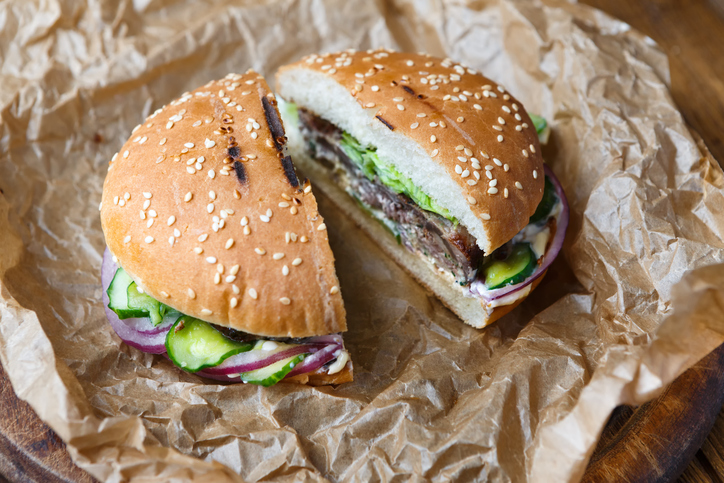Toxic Chemicals Found in Fast Food Wrappers

WASHINGTON – New research based on nationwide tests shows that many fast food chains still use food wrappers, bags and boxes coated with highly fluorinated chemicals. EWG’s report supplements a new peer-reviewed study in the journal Environmental Science & Technology Letters, which shows some of the test samples contained traces of a notorious and now-banned chemical formerly used to make DuPont’s Teflon.
Scientists from nonprofit research organizations including EWG, federal and state regulatory agencies, and academic institutions collaborated to collect and test samples of sandwich and pastry wrappers, french fry bags, pizza boxes, and other paper and paperboard products from 27 fast food chains and several local restaurants in five regions of the U.S. They found that of the 327 samples used to serve food, collected in 2014 and 2015, 40 percent tested positive for fluorine, a likely indicator of the compounds known as PFCs or PFAS chemicals.
“Fluorine-based coatings are used in food packaging to repel grease,” said David Andrews, Ph.D., EWG senior scientist, and co-author of the EWG report and the peer-reviewed paper. “There is very little public information on how much leaching occurs, as there are lots of different types of coatings made with this family of chemicals. Our tests show they are not necessary, because there are PFC-free food wrappers readily available.”
Perfluorinated chemicals, or PFCs and PFASs, have been linked to cancer, developmental issues, reproductive harm, compromised immune systems and other health effects. Although some PFCs, such as those formerly used to make Teflon and 3M’s Scotchgard, have been banned or phased out as hazardous, chemical companies have flooded the market with a new generation of PFCs that have not been adequately tested for safety.
“We don’t know enough about the safety of the new generation of PFCs,” said Bill Walker, EWG managing editor and co-author of the report. “We know there are dangers of exposure to some of these chemicals at extremely low doses, especially during critical windows of child development. A woman who eats fast food frequently during her pregnancy might consume enough of these chemicals to affect the future health of her child.”
DuPont has acknowledged that one of these replacement chemicals does cause cancerous tumors in lab animals. And some of these fluorinated chemicals are migrating from the packaging to food; hot, greasy food actually increases the likelihood of migration.
“It’s concerning that people could be exposed to these toxic chemicals through the food they eat,” said Dr. Laurel Schaider, an environmental chemist at Silent Spring Institute and the study’s lead author. “PFASs have been linked with numerous health effects including cancer. Children are especially at risk because their developing bodies are more vulnerable to toxic chemicals.”
“These molecules are very long-lived in the environment, and simply don’t break down easily and go away,” said Graham Peaslee, a physicist at the University of Notre Dame, who discovered a new application method that allows faster analysis of materials that may contain fluorinated chemicals. “Consumer products like papers that are treated with PFAS will decompose long before the treatment does and these chemicals will enter the environment directly from our landfills. This type of long-lived chemical just isn’t a sustainable practice: once it is made, it doesn’t go away.”
National fast food brands source paper from different suppliers, who in turn collect paper from different sources.
“Up and down the line there needs to be a greater level of concern,” said Walker. “We’re not pointing the finger at the fast food chains or saying it’s safer to eat at one chain compared to another. It’s possible they’re not getting the straight story from their suppliers. This is a snapshot that shows there’s a problem and both the Food and Drug Administration and the restaurant industry should address it.”
EWG’s recommendations include:
- Fast food companies should stop using PFCs or other fluorinated compounds in sandwich or pastry wrappers, fried food containers, pizza boxes or anywhere else where they may come into contact with food. Parent companies should exercise more oversight over their supply chains and the paper sources of their franchises.
- The FDA should further restrict the use of fluorinated chemicals in food or food-contact materials. The FDA should close the loophole that allows companies to self-certify chemicals as Generally Recognized as Safe.
- For consumers, exposure to PFCs in food wrappers can be reduced by eating fresh foods and preparing meals at home. Avoid the use of paper tableware and microwave popcorn. For more tips on how to keep these chemicals out of your body and your home, see EWG’s Guide to Avoiding PFCs.
